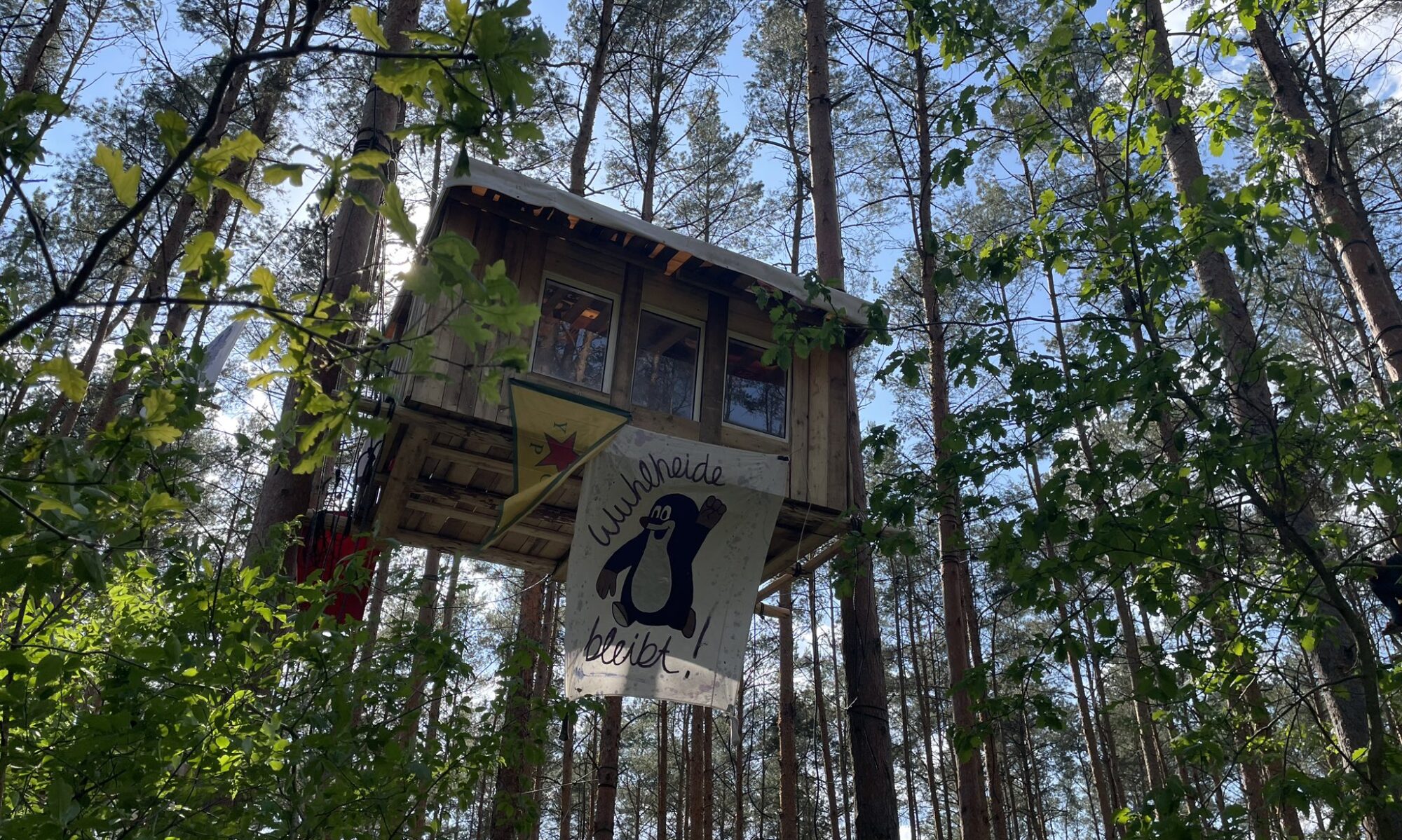Why it is important to preserve the Wuhlheide in Berlin
The Wuhlheide is an urban forest area in Berlin, adjacent to the districts of Oberschöneweide and Köpenik, predominantly a deciduous forest with a high proportion of oaks. In 1911, it was purchased by the city of Berlin for drinking water production. The website of the Berlin Senate Department for the Environment, Mobility, Consumer and Climate Protection states: Berlin is not only a city on the water, Berlin lives from its groundwater. While other cities generally extract their drinking water from the surrounding area, Berlin supplies itself from the groundwater resources in its own urban area. It is further stated that the Wuhlheide is protected as a water protection area by the Water Protection Area Ordinance. The ban on handling substances hazardous to water, but also the general ban on construction in the narrower protection zone, is established. Do not seal any more areas!
In Germany, around 45 percent of settlement and traffic areas are sealed, i.e. built on, concreted, asphalted, paved or otherwise paved (as at 23.01.23). With the expansion of settlement and traffic areas, soil sealing is also increasing. With the sealing of soils, important soil functions such as soil fertility and above all water permeability are lost. Habitats for plants and animals disappear, roads generate noise that stresses animals (and humans!). Soils that are concreted over or asphalted no longer absorb nutrients and rain. When less water gets into the ground, less groundwater is available, drought disasters and drinking water shortages are the result. In addition, the risk of flooding increases because water cannot percolate evenly into the ground. The water masses that are discharged into the sewage systems in such situations can cause them to overflow during heavy rain. And, when soils are permanently sealed off from air and water, the soil fauna goes kaput. This fulfills important functions for the preservation and regeneration of fertile soils. After the 2018 heat wave in Europe, a study by the Karlsruhe Horticultural Office found that one-third of all trees planted in Karlsruhe over the past four years died due to lack of water. Without enough water, trees become weak, and that makes them susceptible to disease.
To this must be added that sealed soil is difficult to remove. Residues of concrete and asphalt are often left in the soil, which have a lasting negative impact on fertility. The surrounding trees and other plants are also affected by the concrete that is poured into the ground next to them. Roots get less water.
 Urban residents need nature! This makes the preservation of urban trees and forests all the more important. The microclimate in cities is negatively affected by the sealing of soils: water can no longer evaporate, which leads to it becoming hotter and hotter in cities. Without trees, there is no shade. It goes without saying that they are unsuitable as a location for plants. Urban trees provide the oxygen we all need to breathe and store climate-damaging carbon dioxide. They also muffle ambient noise, harbor squirrels, green woodpeckers, and so on. Contrary to the sight of roads (-construction), the stress level of people decreases when looking at nature alone. For more nature protection! Sometimes it seems that so many people have forgotten that we ourselves are (part of) nature. It is important, especially in times of advancing man-made climate change, to preserve forests and green spaces (especially in cities). Clearing trees advances a cycle: Clearing trees results in drought disasters. As a result, trees become susceptible to disease more quickly and even more trees die. In addition, it is important not to cut through the Wuhlheide water conservation area with a concrete strip, so that Berlin can continue to supply itself with water in the future. No TVO through the Wuhlheide! No more soil sealing, instead more nature conservation!!! For a livable Berlin, with less car noise!
Urban residents need nature! This makes the preservation of urban trees and forests all the more important. The microclimate in cities is negatively affected by the sealing of soils: water can no longer evaporate, which leads to it becoming hotter and hotter in cities. Without trees, there is no shade. It goes without saying that they are unsuitable as a location for plants. Urban trees provide the oxygen we all need to breathe and store climate-damaging carbon dioxide. They also muffle ambient noise, harbor squirrels, green woodpeckers, and so on. Contrary to the sight of roads (-construction), the stress level of people decreases when looking at nature alone. For more nature protection! Sometimes it seems that so many people have forgotten that we ourselves are (part of) nature. It is important, especially in times of advancing man-made climate change, to preserve forests and green spaces (especially in cities). Clearing trees advances a cycle: Clearing trees results in drought disasters. As a result, trees become susceptible to disease more quickly and even more trees die. In addition, it is important not to cut through the Wuhlheide water conservation area with a concrete strip, so that Berlin can continue to supply itself with water in the future. No TVO through the Wuhlheide! No more soil sealing, instead more nature conservation!!! For a livable Berlin, with less car noise!
Quellen: – https://www.quarks.de/umwelt/darum-sollten-wir-unsere-boeden-nicht-zubetonieren/ – https://www.umweltbundesamt.de/daten/flaeche-boden-land-oekosysteme/boden/bodenversiegelung#was-ist-bodenversiegelung – https://www.bund-naturschutz.de/natur-und-landschaft/stadt-als-lebensraum/stadtbaeume – https://www.berlin.de/sen/uvk/umwelt/wasser-und-geologie/wasserschutzgebiete/ – https://www.dw.com/de/extremwetter-hitzestress-wasser-d%C3%BCrre-gesundheit-gr%C3%BCn-parks/a-54221941
